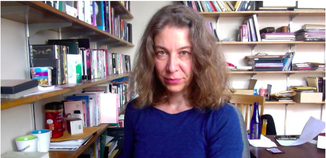Arnika Fuhrmann is an interdisciplinary scholar of Southeast Asia, working at the intersections of the region’s aesthetic and political modernities. Her work models an approach to the study of Asia that is informed by affect, gender, urban studies, and media theory and anchored in thorough cultural, linguistic, and historical knowledge of the region. It stresses a translocal focus that manifests in both geographically and theoretically comparative frameworks.
Fuhrmann’s work strives to understand the theoretical implications of modes of belonging that are simultaneously constituted by religious and secular notions. In this context, she investigates the ways in which affect and aesthetic form shape contemporary political cultures. Her book Ghostly Desires: Queer Sexuality and Vernacular Buddhism in Contemporary Thai Cinema (Duke University Press, 2016) examines how Buddhist-coded anachronisms of haunting figure struggles over sexuality, personhood, and notions of collectivity in contemporary Thai cinema and political rhetoric. The book highlights a Southeast Asian, Buddhist perspective on queerness, femininity, and negativity.
Fuhrmann’s second book, Teardrops of Time: Buddhist Aesthetics in the Poetry of Angkarn Kallayanapong (SUNY Press, 2020), continues to investigate the work that Buddhism performs outside of the sphere of religious instruction. It examines the ways that 20th century Thai poetry uses Buddhist frameworks to create scale for cultural critique, inform modern ethical paradigms, and invent a poetics that reflects the struggles of a globalizing country and region and intersects with the concerns of poets worldwide, such as Paul Celan and Alan Ginsberg.
Fuhrmann’s current book project, In the Mood for Texture: The Revival of Bangkok as a Chinese City (under contract with Duke University Press), investigates the revival of the aesthetics of Chinese pasts and colonial modernity across cinema and hospitality venues.
Her next project, Digital Futures: South/east Asian Media Temporalities and the Expansion of the Sphere of Politics, focuses on the ways that digital media expand the domain of political expression and transcend commonplace distinctions between liberalism and illiberalism. Fuhrmann’s articles have appeared in Camera Obscura, Diogenes, Discourse, Oriens Extremus, and positions: asia critique.
Educated in Europe, Asia, the Middle East, and North America, Fuhrmann strives to bring transnational and transregional perspectives into her research and teaching. Comple-menting her academic work, she engages in cultural programming and works in the curatorial team of the Asian Film Festival Berlin.
Fuhrmann’s work strives to understand the theoretical implications of modes of belonging that are simultaneously constituted by religious and secular notions. In this context, she investigates the ways in which affect and aesthetic form shape contemporary political cultures. Her book Ghostly Desires: Queer Sexuality and Vernacular Buddhism in Contemporary Thai Cinema (Duke University Press, 2016) examines how Buddhist-coded anachronisms of haunting figure struggles over sexuality, personhood, and notions of collectivity in contemporary Thai cinema and political rhetoric. The book highlights a Southeast Asian, Buddhist perspective on queerness, femininity, and negativity.
Fuhrmann’s second book, Teardrops of Time: Buddhist Aesthetics in the Poetry of Angkarn Kallayanapong (SUNY Press, 2020), continues to investigate the work that Buddhism performs outside of the sphere of religious instruction. It examines the ways that 20th century Thai poetry uses Buddhist frameworks to create scale for cultural critique, inform modern ethical paradigms, and invent a poetics that reflects the struggles of a globalizing country and region and intersects with the concerns of poets worldwide, such as Paul Celan and Alan Ginsberg.
Fuhrmann’s current book project, In the Mood for Texture: The Revival of Bangkok as a Chinese City (under contract with Duke University Press), investigates the revival of the aesthetics of Chinese pasts and colonial modernity across cinema and hospitality venues.
Her next project, Digital Futures: South/east Asian Media Temporalities and the Expansion of the Sphere of Politics, focuses on the ways that digital media expand the domain of political expression and transcend commonplace distinctions between liberalism and illiberalism. Fuhrmann’s articles have appeared in Camera Obscura, Diogenes, Discourse, Oriens Extremus, and positions: asia critique.
Educated in Europe, Asia, the Middle East, and North America, Fuhrmann strives to bring transnational and transregional perspectives into her research and teaching. Comple-menting her academic work, she engages in cultural programming and works in the curatorial team of the Asian Film Festival Berlin.

